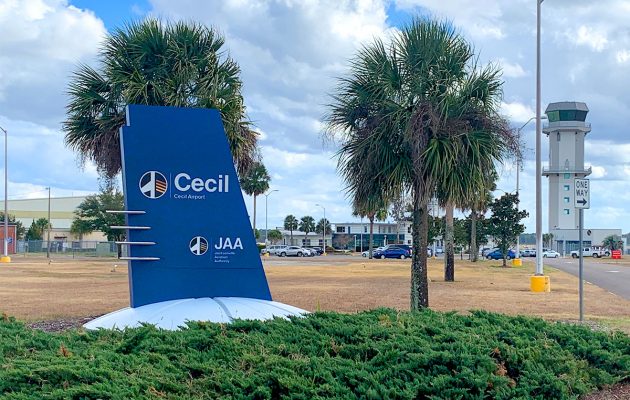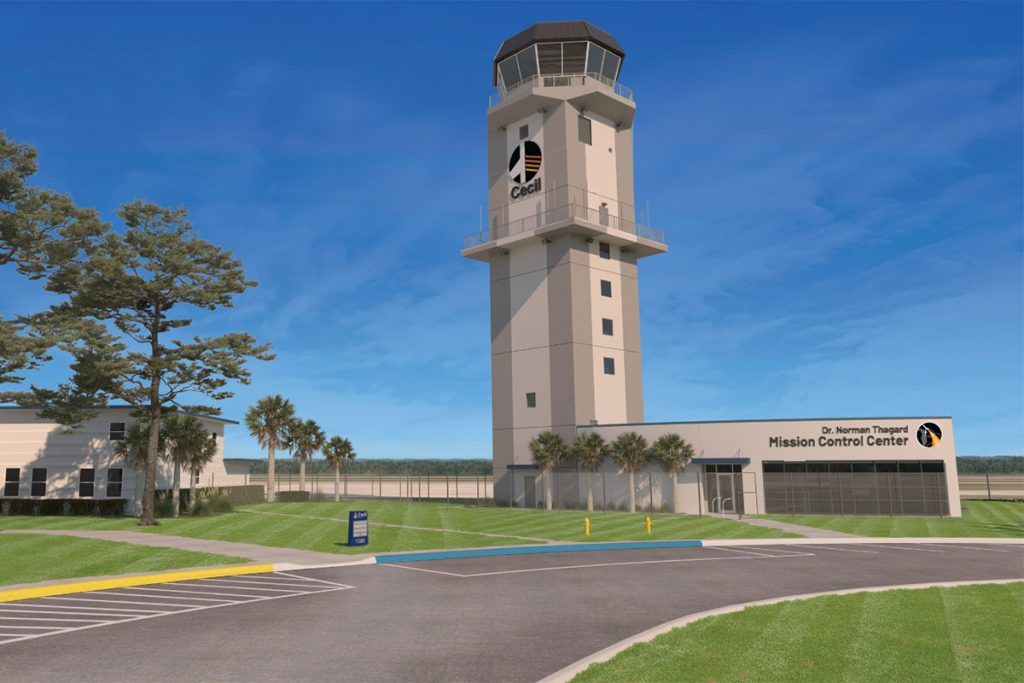Space: The Duval Frontier
Posted on March 7, 2022 By Editor Top Stories

Leaders are vying for a piece of the astronomical economic pie
It’s a sight as Floridian as an alligator: a massive rocket steaming away on the launch pad at Cape Canaveral, ready to depart on another journey into the vast darkness of space. We’ve all cheered the triumph of a successful launch, and felt the frustration of a scrubbed attempt. Less than a month ago, the launch of a SpaceX Falcon 9 rocket was delayed five times before successfully launching on Monday, January 31. The last delay, which scrubbed the launch at T-minus 33 seconds, resulted from a cruise ship wandering into the hazard area.
As frustrating as these delays are for spectators, they are far more frustrating – and costly – for the companies involved in getting rockets and their payloads into space. Each delay is estimated to cost a company like SpaceX a quarter of a million dollars. And each setback not only affects that day’s launch, but every other military and commercial payload in line behind it.
Since 1950, Cape Canaveral has been the primary rocket launch location for all NASA spacecraft, but the rapid expansion of private commercial space carriers – led by Elon Musk’s SpaceX and Jeff Bezos’ Blue Origins – has increased the need for additional launch and recovery sites. Currently, the Federal Aviation Administration has approved fourteen such spaceports throughout the United States, with four located in Florida. Three are dotted around Cape Canaveral.
The fourth is right here in Duval County, at the site of the decommissioned Cecil Naval Air Station on the westside. Since being licensed as a spaceport in 2020, the site has seen construction of an air traffic control tower and mission control center, as well as approval of funds to construct a beltway road on the site. Cecil Spaceport is currently managed by the Jacksonville Aviation Authority (JAA), which also runs the Cecil Airport at the same location.
That may change soon, if Wyman Duggan has his way. The State Representative from Jacksonville, whose 15th District includes the Cecil Spaceport, is sponsoring HB 1303, which would create the Northeast Florida Regional Spaceport Authority to promote the commercial use of the Cecil Spaceport and – more importantly – gain access to state and federal infrastructure money to further improve the site and attract commercial space carriers to Northeast Florida. The bill passed the House Tourism, Infrastructure and Energy Subcommittee on February 8, but unless something major happens in the next week, it may stall out for this year.
Wyman remains hopeful that enthusiasm generated over the coming months will help propel the bill further in the 2023 session. “It can take a couple years with a big concept bill,” he said. Duggan noted that Speaker Designate Paul Renner ran for the 15th District seat eight years ago, and is therefore very familiar with the potential of the Cecil site.
In addition to Jacksonville’s beaches, golf courses, and cultural treasures, North Florida offers several benefits unique to space commerce. Its location near the equator means that vehicles can be launched into space using less fuel than launches at higher latitudes. Additionally, the nearby Atlantic Ocean serves as a hazard area in the event of mission failure.
Beyond that, Jacksonville has been laying the groundwork to provide the most critical piece of a thriving commercial space economy – industry-specific education opportunities. Over the last twenty years, the School of Engineering at the University of North Florida has risen into the top 15% of engineering programs in the country. The Cecil campus of Florida State College at Jacksonville has already developed programs in fields that provide support to commercial aviation. The school’s proximity to the planned 370,000-square-foot Boeing facility at Cecil Airport could lead to tailored partnerships for the training of the future spaceport workforce.
The Cecil Spaceport has been licensed for horizontal launches, as opposed to the more traditional vertical launches that occur at Cape Canaveral. In a horizontal launch, a rocket is attached to a large airplane, which flies out over the ocean before the rocket is detached and ignited. Horizontal launches have a few key advantages over vertical launches – chief among them the ability to avoid weather delays by flying the rocket to an area of clear skies before ignition.
Another key difference between Cecil Spaceport and the Kennedy Space Center is that the Cecil site is operated by the municipal JAA, while Kennedy is an active United States military base. At a time when global tensions are high, Kennedy may prioritize military operations at any point, leaving commercial space ventures at the back of the line for launch pads and support.
“The facilities around the Cape (Canaveral) are victims of enormous success,” Duggan said. “Between NASA and DOD and Blue Origin and SpaceX, they are bursting at the seams. There is limited ability for a new operator to get in there. So creating (the Northeast Florida Regional Spaceport Authority) is not going to take away anything from Brevard, it will create an opportunity for new users and operators who can’t get in down there.”

But what, exactly, would a bustling commercial spaceport in Jacksonville be doing? To give just one example, that Falcon 9 whose launch was delayed in January was carrying Starlink satellites. Starlink is a SpaceX project to install a mesh network, or constellation, of 40,000 small satellites which will work together to create internet service accessible from every corner of the globe, from the middle of the Pacific to the North Pole. Each satellite is about the size of a table and weighs less than 600 pounds, and Falcon 9 rockets carry them to space in groups of about 40. These satellites are programmed to de-orbit every 3-4 years, burning up in the atmosphere on re-entry. Like a transcontinental juggling act, batches of Starlink units are manufactured in Washington State, then shipped to Florida to be launched and finally falling back down to Earth a few years later. The constellation will need constant replenishment as old satellites are removed from service, and the rockets that deliver the satellites will need constant maintenance. The average starting salary for maintenance technicians of this type is well over $50,000 a year.
Additionally, commercial spaceports may provide critical support as some manufacturing operations move off-planet. This is known as the “space-for-space economy.” For example, a space telescope is a delicate instrument that must be engineered not only to withstand the stresses of space itself, but of a rocket launch. If the manufacture of the telescope is moved into space, where it will be utilized, it can be made bigger and cheaper than on Earth. Components would have to hitch a ride to the manufacturing facility on a rocket launched from a spaceport just like Cecil.
Commercial spaceports could also be involved in space tourism, attracting wealthy clients to the area for suborbital flights. “We have a fantastic opportunity in the commercial tourism industry,” Duggan said. He pointed out that tourism clients must commit to stay in their launch location for multiple days before their trips, as launch windows can shift with the weather. Wealthy clients will “have the choice to spend those two weeks in the Mojave Desert with Richard Branson (of Virgin Galactic), or you could go to Boca Chica, Texas with Elon Musk (SpaceX), or you could be waiting at the Four Seasons downtown or the Ritz Carlton on Amelia Island. They’ll be playing golf, out on the river, shopping, and eating at our restaurants until they go to space.”
Duggan admits that some of this sounds like science fiction, but Morgan Stanley estimates the global space economy is already worth $350 billion dollars and could reach $1 trillion by 2040. Duggan wants to get Cecil Spaceport established quickly, so that North Florida can reap the benefits of this growing industry.
By Windy Taylor
Resident Community News




 (No Ratings Yet)
(No Ratings Yet)Blue Origins, Boeing, Cecil Naval Air Station, Cecil Spaceport, Elon Musk, Falcon 9, Florida State College Jacksonville, HB 1303, JAA, Jacksonville Aviation Authority, Jeff Bezos, NASA, Northeast Florida Regional Spaceport Authority, SpaceX, Starlink, University of North Florida, Wyman Duggan





